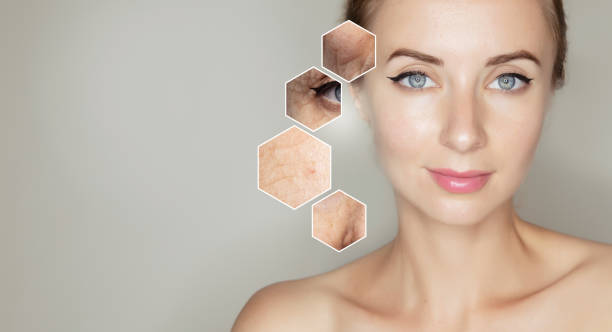Rejuvenation Dermatology: Non-surgical Skin Treatments to Improve Appearance and Health
Rejuvenation dermatology is a specialized field of dermatology that offers non-invasive techniques to enhance skin health and address different cosmetic concerns. Laser therapy has gained immense popularity as a treatment option for fine lines, wrinkles, hyperpigmentation, and acne scars. In addition, chemical peels and microdermabrasion are other effective methods that are used to improve skin texture and reduce the appearance of various skin imperfections. These treatments can help clients achieve a youthful, radiant complexion without undergoing invasive procedures and improving skin texture and reducing the appearance of imperfections.
In addition, rejuvenation dermatology offers treatments that can help the skin produce more collagen and elastin, such as microneedling, radiofrequency therapy, and ultrasound therapy. Injectables like Botox and fillers can temporarily reduce the appearance of fine lines and wrinkles while also restoring volume and fullness to areas of the face.
Overall, rejuvenation dermatology offers a variety of non-surgical treatments for skin rejuvenation and facial rejuvenation, helping individuals achieve smoother, younger-looking skin without the need for surgery.
LASER THERAPY
Laser therapy is a popular treatment in rejuvenation dermatology, which employs focused light energy to target and eliminate specific skin concerns such as fine lines and wrinkles, hyperpigmentation, and acne scars.
In most cases, these rejuvenation dermatology treatments are non-surgical, meaning they involve minimal invasion and have a short recovery period. The exact number of treatments required may vary depending on the individual’s specific skin concerns and the severity of their condition.
INJECTABLES
Injectables are also widely used in rejuvenation dermatology, including fillers like hyaluronic acid, which restores volume to areas that have lost fullness due to aging or other factors.
FILLERS
Injectable substances known as dermal fillers are commonly used to reduce the appearance of fine lines and wrinkles. Botulinum toxin, also known as Botox, is another injectable treatment that can temporarily paralyze facial muscles, thus minimizing wrinkles caused by facial expressions. These treatments are effective for improving the appearance of the skin without the need for surgery, and the results are typically noticeable shortly after treatment.
CHEMICAL PEELS
Chemical peels are another effective treatment option in rejuvenation dermatology. This process involves applying a chemical solution to the skin, which causes the top layer to peel off, revealing smoother, younger-looking skin underneath.
Chemical peels are a versatile solution to various skin concerns such as wrinkles, hyperpigmentation, acne, and scarring. The potency of the chemical solution used and the individual’s skin concerns determine the depth of the chemical peel administered.
MICRODERMABRASION
Microdermabrasion is a non-invasive cosmetic procedure that involves the use of a specialized device to exfoliate the top layer of skin, revealing smoother and more even-toned skin beneath. It is a versatile treatment that can improve the appearance of various skin concerns, such as fine lines, wrinkles, hyperpigmentation, and acne scars. The level of intensity of the microdermabrasion treatment can be customized based on the individual’s skin type and concerns.
MICRONEEDLING
Rejuvenation dermatology encompasses treatments that stimulate the production of collagen and elastin in the skin, including microneedling. During microneedling, a specialized device creates tiny punctures in the skin, which activates the body’s natural healing process and encourages the growth of new collagen and elastin. This results in firmer, smoother skin with continued treatments.
RADIOFREQUENCY (RF MICRONEEDLING)
There are several rejuvenation dermatology treatments that one can consider, including radiofrequency therapy and ultrasound therapy. Radiofrequency therapy uses heat to stimulate collagen production, which can help improve the appearance of fine lines and wrinkles while also enhancing skin tightening and overall skin health. Ultrasound therapy, on the other hand, employs sound waves to promote new collagen growth, which can lead to firmer and smoother skin. Both treatments offer non-invasive options for improving the skin’s health and appearance.
Rejuvenation dermatology provides a plethora of non-surgical treatments that can enhance the health and appearance of the skin. Various skin concerns, such as hyperpigmentation, fine lines, wrinkles, and acne scars, can be effectively treated with these treatments. Patients can choose from a variety of options, including chemical peels, microdermabrasion, dermal fillers, and collagen-stimulating therapies like microneedling and radiofrequency therapy. With the use of these techniques, patients can achieve a noticeable improvement in their skin without the need for invasive surgery.
What are some questions to ask a dermatologist?
- What is the cause of my skin condition?
- What treatments are available for my skin condition?
- How can I prevent my skin condition from recurring?
- Are there any lifestyle changes that can improve my skin health?
- What products should I avoid or incorporate into my skincare routine?
What are the top dermatology trends?
- Customized skincare routines based on skin type and concerns.
- Increased use of technology, such as telemedicine and artificial intelligence in skin analysis and diagnosis.
- Growing popularity of natural and organic skincare products.
- Focus on preventative skincare to maintain healthy skin.
- Advancements in laser and light therapies for skin rejuvenation and hair removal.
What is the most common procedure in dermatology?
As per the American Society for Dermatologic Surgery’s reports, the most common dermatology procedures are:
- Skin cancer removal
- Skin tag removal
- Mole removal
- Acne treatment
- Chemical peels
What questions should I ask my dermatologist about acne?
- What is the underlying cause of my acne?
- What skincare products should I use to prevent or treat acne?
- Are there any prescription medications or topical treatments that can help my acne?
- How can I prevent acne scars?
- Are there any lifestyle changes that can improve my acne?


